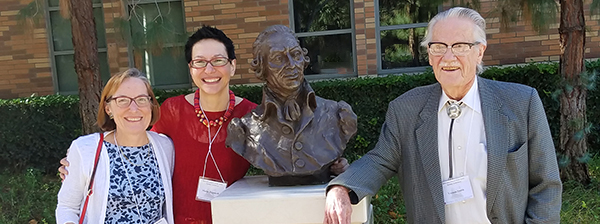
As I return to my day-to-day decanal job after attending the International Adam Smith Society (IASS) conference, I reflect on my role leading a small, nonprofit academic society. Slightly less than half of IASS members are from the U.S. We have enjoyed exciting growth and financial stability during the last five years. We are an intellectually diverse and talented group of scholars, drawn from philosophy, political theory, literature, and economics. Many members have a public intellectual presence, in addition to being professors. Most of us want to improve the world, and Smith is a rich source of ideas about how best to do so.
The demands of leading a nonprofit are in many ways similar to those required for other forms of leadership. Two features strike me as particularly important.
Rallying and nudging are constant musts.
At the Jepson School of Leadership Studies, we stress that leadership and persuasion go hand in hand. This is perhaps especially so in the nonprofit world, where volunteers often do the bulk of the work. In fact, the IASS relies entirely on volunteer labor. No one is compensated for the many tasks—bookkeeping, record taking, report writing, organizing conferences, and so on—we undertake for the society.
For some, the volunteer work does not figure in the formal evaluations they receive for their academic positions.
Thus, there is a special and pressing need for leadership as persuasion. One must constantly rally participants to serve and nudge those who have agreed to do so. The ability to persuade is paramount.
Working across difference is a must.
Like any organization, nonprofits thrive when they include many points of view. Thus, the IASS cannot be insular. It must be open to new interpretations of Smith’s works as they come to the fore. Some see Smith as an egalitarian, while others focus on his economic views related to the marketplace and government intervention. Still others hold that he is primarily a virtue theorist.
As members of a small, vibrant society, scholars must be open to new ideas and interpretations. We will become irrelevant to swaths of scholars if we fail to welcome new views. More than this, we must find ways to challenge one another vigorously and civilly.
Having acquired diverse members, the additional challenge is to embed these varied perspectives in the institution, the governing structure and positions, as well as the recognized scholarship (publications and conference venues). IASS met last year in Chile and this year in the U.S. and will meet next year in Japan. We are actively seeking to provide the means to connect large and growing groups of scholars.
It’s a joy to lead this group!
Photo: IASS president Sandra Peart (left) stands by a bust of Adam Smith with IASS board member Maria Pia Paganelli and keynote speaker Vernon Smith, a Nobel laureate in economics.

In addition to your brilliance, I have loved your sense of humor and of course the Jepson Leadership School.